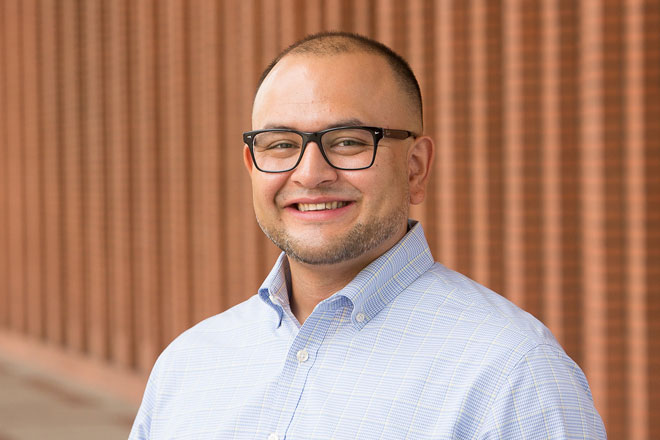
Pullias Center welcomes new faculty member Adrian Huerta
Adrian Huerta, an expert on college access and equity for boys and men of color, will join the Pullias Center this fall as an assistant professor of education, with a focus on higher education.
Currently a Provost Postdoctoral Scholar at the Pullias Center, Huerta will transition to his new USC Rossier faculty position in August. In his new role, he will continue his research on educational equity for underserved and vulnerable populations, from gang-affiliated youth to student-parents in community colleges.
“Adrian’s work as a postdoc has broadened and amplified the Pullias Center’s research in the last year,” said Adrianna Kezar, co-director of the Pullias Center and Dean’s Professor in Higher Education Leadership. “His work is already integral to the center, so I’m extremely pleased he’ll be joining us on a more permanent basis as faculty.”
William G. Tierney, Pullias Center co-director and Wilbur-Kieffer Professor of Higher Education at USC Rossier, also welcomed the appointment.
“Adrian’s research really gets to the heart of the Pullias Center’s mission, which is improving college outcomes for underserved students,” he said. “At Pullias and USC Rossier, he will lead conversations that will help our students and faculty think about equity and access from new perspectives.”
Huerta said he was excited to join the Pullias Center faculty.
“I’ve been lucky to be part of the Pullias Center as a postdoc, where I got the opportunity to pursue the educational research that’s both personally meaningful to me and vitally important in higher education more broadly,” Huerta said. “I’m looking forward to this new role as a faculty member, and especially happy I’ll soon be teaching and mentoring students.”
Pursuing access and equity
As a faculty member, Huerta will continue his current research projects, which include a study of best practices for recruiting and retaining men of color in colleges and universities and a study of how Latinx student-parents prepare for careers and transition into the labor market.
“I think both of those projects are really valuable, in terms of helping colleges and universities figure out how to best serve these student populations,” Huerta said. “The findings have the potential to allow these institutions to be more efficient and effective in pursuing their educational missions.”
A widely-published scholar, Huerta has recent papers in major educational journals on topics ranging from engaging the knowledge and skills gang-affiliated youth bring to schools to exploring the reasons many Latino men opt for military careers over college enrollment. His work appears in Teachers College Record, Journal of College Student Development, Journal of The First-Year Experience & Students in Transition and other practitioner monographs.
Prior to joining the Pullias Center, Huerta was selected as a Poverty Scholar-in-Residence at the University of Washington, West Coast Poverty Center. He earned his doctorate and master’s in higher education and organizational change at University of California, Los Angeles, a master’s in educational policy and leadership at The Ohio State University, and a bachelor’s degree in human services counseling from University of Nevada, Las Vegas.
Huerta speaks frequently on educational equity issues. Last month, he served as a panelist at the Obama Foundation’s MBK Rising! Conference in Oakland, Calif., giving a talk titled “Our Boys Are Not The Problem: Asset Based Framing for Working with Boys and Young Men of Color.” Next month, he’ll present several papers at the American Educational Research Association’s annual meeting.
“I’m especially looking forward to a symposium I coordinated that will focus on boys and young men of color from a state-level perspective,” Huerta said. “UCLA professor Tyrone Howard is the discussant, and I expect this will lead to an engaging, important and necessary discussion.”